The 55th Session of the Human Rights Council
13 March 2024
Agenda Item 3
Interactive Dialogue with the UN Secretary-General, Virginia Gamba, for
Children and Armed Conflict
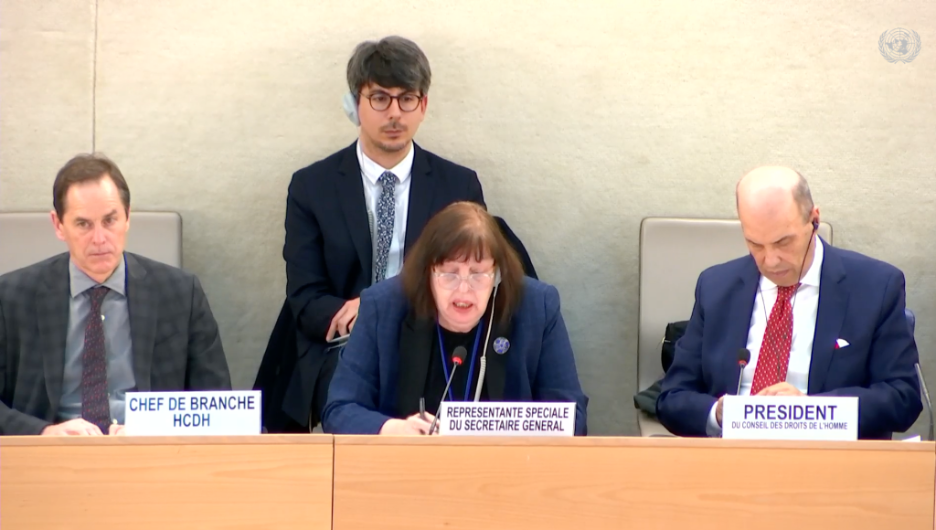
By Breshna Rani / GICJ
Executive summary
On 13 March 2024, at the 55th Human Rights Council (HRC) Session, Agenda Item 3 featured an Interactive Dialogue with Virginia Gamba, the Special Representative of the Secretary-General for Children and Armed Conflict (SRSG). The SRSG presented her report titled ‘Children and Armed Conflict’, published on 28 December 2023[1]. Her extensive report shed light on the severe challenges in tackling the growing rise of international violations that endanger the state of children in armed conflicts. The report concluded with nine holistic recommendations[2] for States, which will be highlighted in the current discussion report.
During the oral session, nearly 76 States and civil society organisations participated and posed questions to the SRSG. It was particularly notable to witness war-torn states like Syria, Iraq, and Palestine participate in this crucial and significant discussion. During her report and the oral session, the SRSG addressed the issue of attacks on schools and their protection as a civilian body during an armed conflict. She highlighted that the ongoing and escalating disregard for international human rights and humanitarian law serves as the primary force behind attacks on schools and their military use. Which pushes children out of school, making them easy prey for recruitment in armed activities. In the nexus between children being part of terrorist activities and the fight against terrorism, SRSG said children actually or allegedly associated with armed groups must primarily be treated as victims. The international juvenile justice standards and standards of fair trial must be applied.
The SRSG noted that one way the international community can collectively address the many issues relating to children in armed conflicts is to follow the Convention on the Rights of the Child (CRC)[3], ‘It must be fully implemented and domesticated in every country that has signed and ratified it’. The SRSG said children should be involved and welcomed to participate in the decision-making on issues that concern them – they should play a key role. In line with this, the SRSG said that during her Mandate, her office started a new campaign led by children, which was launched this year after the success of the Act to Protect Children Affected by Armed Conflict campaign, which concluded in December 2023[4].
𝐆𝐞𝐧𝐞𝐯𝐚 𝐈𝐧𝐭𝐞𝐫𝐧𝐚𝐭𝐢𝐨𝐧𝐚𝐥 𝐂𝐞𝐧𝐭𝐫𝐞 𝐟𝐨𝐫 𝐉𝐮𝐬𝐭𝐢𝐜𝐞 (𝐆𝐈𝐂𝐉) commends the SRSG for her report and her initiatives in putting children at the forefront of an important campaign. Children are the foundation of our society; they are highly vulnerable and innocent. They are not adequately protected against various forms of physical and emotional harm, and thus, we stand with SRSG to urge States to give due regard to safeguarding children and enforcing strict laws that criminalise harm against children in armed conflicts, including providing rehabilitative support.
REPORT OF THE SPECIAL REPRESENTATIVE OF THE SECRETARY-GENERAL
SRSG’s report covered December 2022 to December 2023 and was submitted pursuant to General Assembly Resolution 76/147[5]. The extensive data in the report is primarily supported by her experiences gathering information during field visits to various States and UN Country Task Forces. The SRSG has also produced multiple country reports during her tenure that provide a close analysis of the state of children in armed conflicts, such as in Afghanistan[6], the Syrian Arab Republic[7], Nigeria[8], South Sudan[9] and the most recent one in Colombia[10], published on 13 February 2024.
The HRC55 report begins with a discussion on using the United Nations human rights mechanisms to combat violence against children in armed conflict, and one of the ways suggested by SRSG to do this is by achieving universal ratification of the Optional Protocol to the Convention on the Rights of the Child on the involvement of children in armed conflict[11]. The SRSG briefly mentioned the work undertaken by her office and their contribution towards finding solutions for this global problem. For example, the SRSG met country mandate holders, the Independent Expert on the human rights situation in Somalia, and the Special Rapporteur on the human rights situation in Afghanistan[12]. This showed collaborative efforts to work with various offices and share expertise for an important cause.
In highlighting the challenges faced in protecting conflict-affected children, the SRSG mentioned the difficulty in accessing conflict areas and monitoring and recording data on grave violations of international law. She noted that ‘In Israel and the Occupied Palestinian Territory, in December 2022, the Special Representative conducted a visit to continue her engagement with the Israeli authorities and Palestinian armed groups to adopt clear and time-bound commitments to end and prevent grave violations against children’[13] and that ‘In Iraq, the Government and the United Nations signed, in March 2023, an action plan to prevent the recruitment and use of children by the Popular Mobilization Forces’[14].
In some concerning trends, schools and hospitals have been repeatedly attacked, and many children have been unlawfully detained for their associated or alleged association with armed groups. At the beginning of December 2022, over 600 children were arrested in Syria for their alleged association with mainly Da’esh and over 31,000 children were suspected of family ties to Da’esh continued to be held in Hawl and Rawj Camps in north-eastern Syria[15]. This is followed by harsh confinement, denial of adequate medical care and violence of a sexual, mental and physical nature. The SRSG recommended the reintegration of these children should be the primary response, and any legal process to investigate the situation and alleged crimes committed by these children should be as per international juvenile standards. For example, they should primarily be treated as victims[16] in line with Security Council Resolution 2427[17].
The report highlighted the inclusiveness of children with disabilities, an issue that is now widely addressed and requires more effort from international actors[18]. From the lack of data, the stigma attached, and the lack of resources to support these children during a state of urgency, dire attention is required. The SRSG had three recommendations to bridge the gaps in disability inclusion; the first was ‘strengthening data collection’ and ‘disaggregating it by disability’. The second recommendation advocated working with children with disabilities and organisations that support them in understanding their needs and struggles to ensure that any policy developed will reflect their voices. The third recommendation was advocacy-based, involving awareness-raising initiatives with capacity building, such as UN child protection staff[19].
In concluding the report, the SRSG provided the following recommendations:
1. SRSG called upon all parties to comply with their obligations under IHL[20], IHRL[21], and IRL[22]. For example, the military should avoid using schools or health facilities[23].
2. Respect the rights of the children under the CRC, and SRSG called on Member States to recognise all persons under 18 years of age as children[24] as countries like Afghanistan determine a child’s maturity age as they hit puberty rather than using the standardised age assessment.
3. SRSG called on Member States that still need to ratify the Optional Protocol to the CRC on the involvement of children in armed conflict and adopt it to national legislation and policies[25].
4. SRSG called on parties to remove all impediments to humanitarian access to children and enable unimpeded access to education, especially for girls of conflict-affected children[26].
5. SRSG called upon Member States to treat children allegedly associated with armed groups, including violent extremist groups, primarily as victims, prioritise their reintegration and address the detrimental impact of stigma on their reintegration[27].
6. SRSG called upon Member States to take effective and appropriate steps to ensure the protection and safety of children with disabilities in situations of armed conflict[28].
7. SRSG encouraged Member States and other relevant stakeholders to integrate a child protection lens in tackling climate emergencies. With strengthened coordination among United Nations system entities with a stake in those agendas and the use of child-centred risk assessments for anticipating and addressing the specific needs and vulnerabilities of children living in areas affected by both climate-related stressors and armed conflict, with a view to preventing the six grave violations against children.[29]
8. SRSG encouraged the HRC to continue advocating and acting on the recommendations on the protection of children in armed conflict and further called on Member States to ensure that dedicated child protection resources and capacity are allocated in relevant budgetary provisions[30].
9. SRSG urged Member States to include specific references to information on grave violations against children, accountability initiatives and gaps in their applicable legal and policy frameworks in their submissions to those bodies[31].
INTERACTIVE DIALOGUE WITH THE SPECIAL REPRESENTATIVE OF THE SECRETARY-GENERAL
COUNTRY STATEMENTS
State of Palestine, represented by Ms Riham Bargougthi
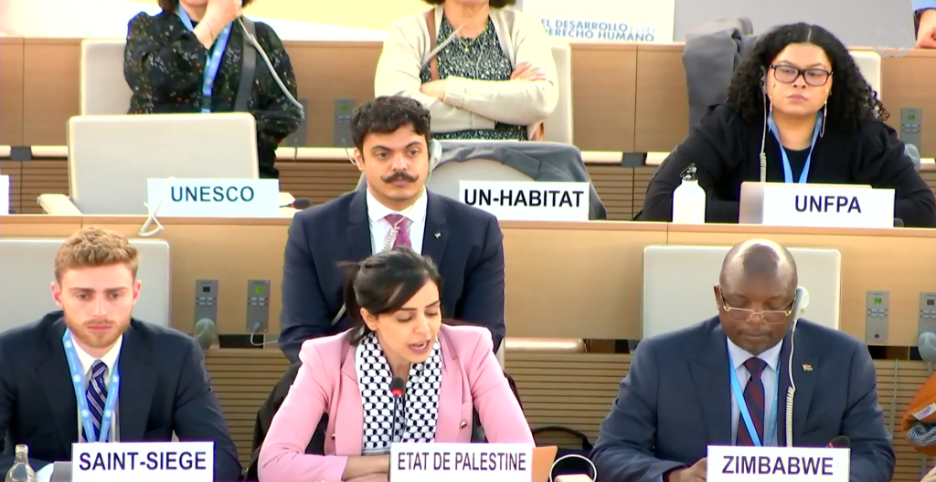
The State of Palestine, aware that the world is advocating for the children of Gaza and hearing their distress calls, went one step further to share personal experiences and stories of some children. In the limited time of 1 minute and 30 seconds, the State of Palestine made an impact. The representative said, ‘I am so scared, please come. Some of the last words of 6-year-old Hind Rajab said on a telephone call while pleading with the Palestinians to rescue her. Hind was found killed 12 days after crying for help, killed along with the two paramedics who tried to save her, trapped in a car, surrounded by her relatives' corpses’.
The representative also shared her extreme disappointment towards the international institutions; she said, ‘The ICJ issued its order on Israeli genocide. We provide you with resolutions and statistics, and you condemn, and you deplore, and you reject. But there is nothing that you or your resolutions have ever done’. The disappointment came from a place of hopelessness and extreme suffering, especially given the children in Gaza continue to suffer despite the ICJ’s order and are now facing the inexplicable hardship of famine[32], in the month of Ramadan.
Pakistan, on behalf of the Organisation of Islamic Cooperation by Mr Danyal Hasnain
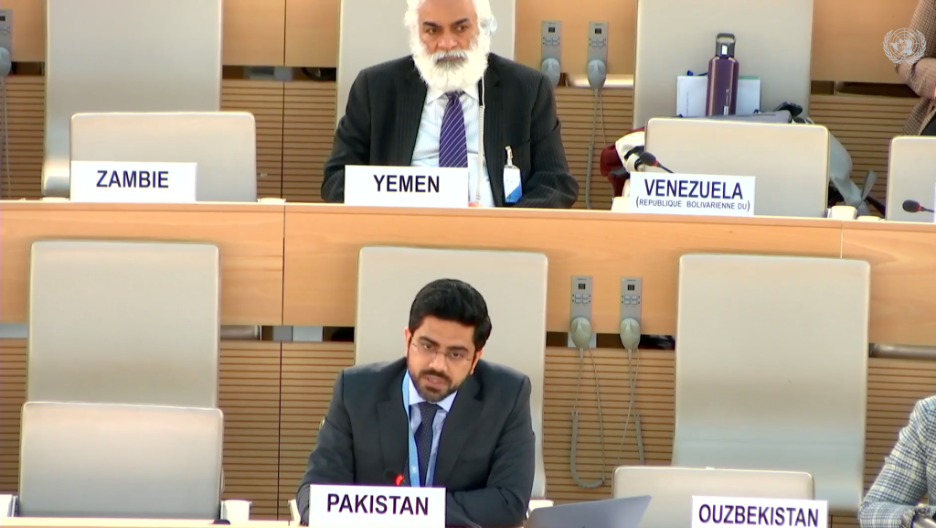
Pakistan took the floor to highlight the situation in Gaza, mentioning that nearly 13,000 children are dead and 17,000 without a parent and ‘no child in Gaza is free from pain, hunger or fear’. Pakistan shared its concerns by stating that ‘we had expected greater attention to this crisis by the Office of the Special Representative’. Pakistan also cited international law and each State’s legal obligations, for example, under the UNSC Resolution 2143[33], which urges States to combat violence against children in armed conflict. In addition, Pakistan was one of the only States to speak on the trade of arms and their role in contributing towards armed conflict; it reminded State parties of Article 7(4), which asks the exporting State to ‘take into account the risk of the conventional arms covered under Article 2 (1) or of the items covered under Article 3 or Article 4 being used to commit or facilitate serious acts of gender-based violence or severe acts of violence against women and children’[34]. He concluded by expressing hope that the Special Representative would firstly urge for the implementation of ICJ’s provisional measures, secondly promote the collection of information on crimes against children in Gaza and lastly, participate with the Committee on the Rights of the Children and other UN Agencies to explore steps for restoring the lives of children in Gaza.
Some other states that remembered the children of Gaza in their speeches were Sri Lanka, Qatar, Syria, Malaysia and Iran.
Israel represented by Ms Meirav Eilon Shahar
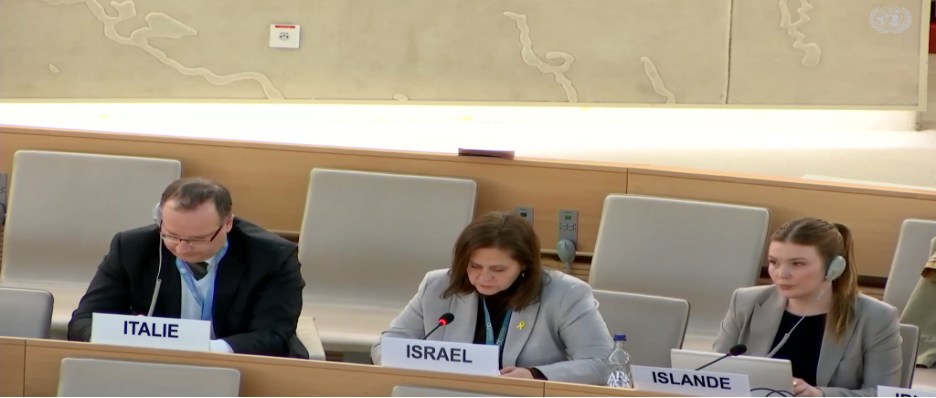
Israel’s representative stated, ‘Children are not a pawn of war. They should never be targeted, brutalised, burned alive, taken hostage, torn from their beds and held as a bargaining chip by a murderous terrorist organisation. No child should ever be used as a human shield by a terrorist organisation that seeks to maximise civilian harm. No school should cover the opening shaft of a terror tunnel. Crips should not store RPGs. Teddy bears should not be stuffed with weapons.’ As a probable tongue slip, she said, ‘Children should not be taught to hope,’ correcting it by ‘should be taught to hope for a better future’, whether it was an error or reflecting the true intentions of the State of Israel that children should not be taught to hope, is for the public to assess.
Israel concluded the speech by stating, ‘To turn away from the reality of children's lives under Hamas rule is to ignore Hamas’s contempt for the law and utter inhumane towards Palestinian children’. Ironically, Israel showcased its support for protecting Palestinian children when, even before the 7 October 2023 attacks, innocent children were shot and severely injured. Reports after the 7 October 2023 attack and the conflict thereafter show that up to 280 government schools and 68 UNRAW-run schools have been destroyed or damaged[35] and before that, Israel had a consistent record of demolishing schools and preventing Palestinian children from exercising their right to education[36]. On 25 January 2023, an Israeli officer shot Wadea Abu Ramuz, age 17, from behind, and between 2015-2022, the UN attributed 8,700 child casualties to Israeli forces[37]. Yet, Israel has not been listed in the UN Secretary General’s list of shame[38]. Not to mention that Israel has employed as many ways as possible in this sometimes imaginable dystopian world by purposely creating a state of famine and starving young children[39]. In the midst of this, Israel showing its artificial sympathy for Palestinian children is nothing less than cruel, and the international community must realise the gravity of the situation of children in Gaza and the suffering they have endured not since 7 October 2023 but from decades before.
Yemen, represented by Mr Mohamed Al-Foqumi.
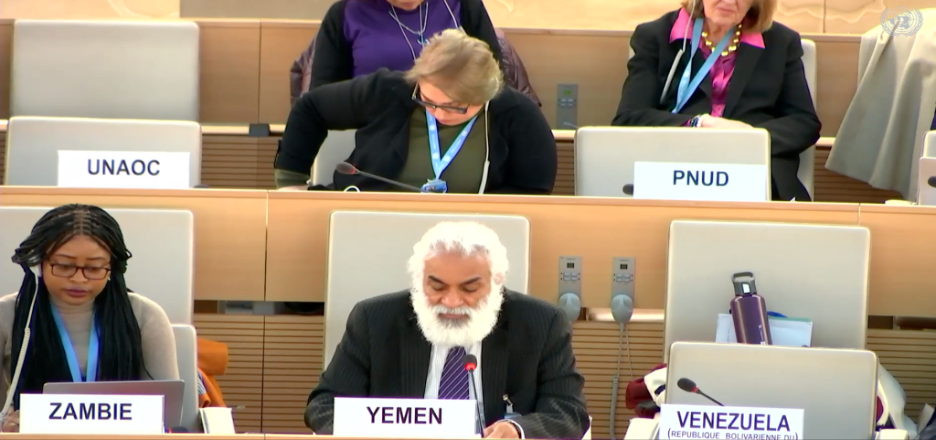
Yemen urged the Houthis to comply with their commitments after signing the UN plan of action against the recruitment of children in 2022, as they have been suspected of recruiting more children after the 7 October 2023 attack and children as young as 13[40]. Yemen also ratified[41] the Optional Protocol on the Rights of the Child on the Involvement of Children in Armed Conflict, which prohibits non-state armed groups from recruiting individuals under the age of 18.
‘We highly value what is stated in paragraph 19, which shines a light on our cooperation with the UN plan of action on the prevention of child recruitment. However, we have certain doubts about the Houthis' implementation of their commitments even though they have signed this plan of action with the UN against the recruitment of children. Houthis recruits children in various places and continues this phenomenon through military mobilisation. President, it is shameful that the world sees the Israeli occupying military decimating Gaza and its people without doing anything and without ending the onslaught on Gaza, protecting people and rescuing them. We call upon the Special Representative to condemn acts of killing and starvation committed by the Israeli army against children of Gaza, and we call for an immediate end to the onslaught and holding Israeli occupation forces against atrocities’
Syrian Arab Republic, represented by Ms Khawla Youssef
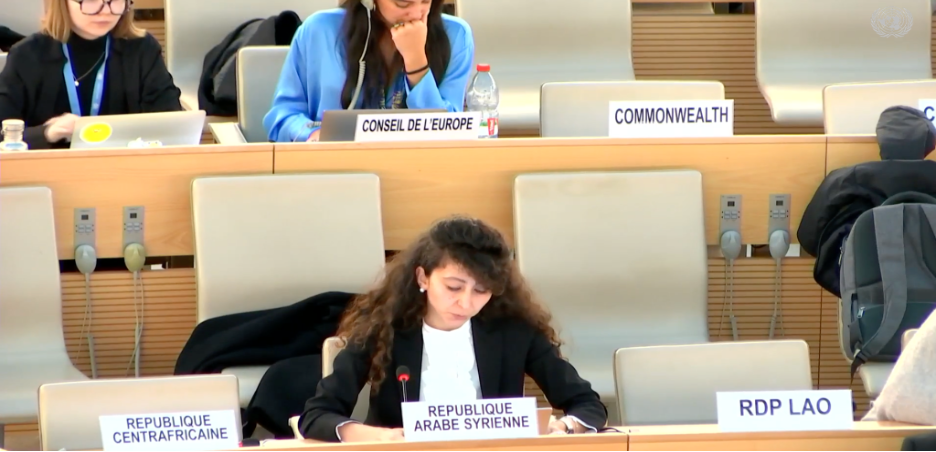
Syria’s representative stated, ‘In achieving progress in promoting and protecting children's rights requires devotion to this cause and unifying efforts to address the root causes of children suffering objectively and in a way that helps to create an environment that provides the requirements for their care, development and participation in building their countries. Therefore, Syria continues to have dialogue and cooperation with several international organisations to support the capabilities of its national institutions in implementing its international obligations in this regard. And we welcome sincere efforts to serve this goal to help in addressing and mitigating the impacts of exceptional circumstances that the country went through. Once again, we urge Mrs Gamba to stop engaging in activities that undermine the credibility of her mandate, including those that threaten the territorial integrity of States, as the malicious propaganda carried out today by the Turkish Delegation, which we urge to end its occupation and support of terrorism in Syria. We strongly call on Mrs. Gamba to address the biased tendencies that have stigmatised the report over the years. Also, we call upon the mandates concerned with protecting children and their rights to condemn the war and the occupied Palestinian territories and to end the decades of apartheid and the continuing genocide against the Palestinian people.’
Afghanistan
Afghanistan was called on to speak, but the representatives did not appear to be in the meeting room, the reasons for which are unknown. However, it is prudent to mention the state of children, especially girls, in Afghanistan under the 2021 Taliban regime and note excerpts from the Secretary General’s Country Report on Afghanistan in 2023[42]. The report covered the period from 1 January 2021 to 31 December 2022 and contained information on six grave violations committed against children in Afghanistan.
- Recruitment and use:
It was verified that during the reporting period, 257 children, some as young as 12 years old[43], were recruited and used. This trend was similar to the previous reporting period, indicating that only a little has changed. To the positive efforts of the SRSG’s Office, the country task force facilitated the release of 494 children in 2022 after advocating with the Taliban on a provincial scale[44].
- Killing and maiming:
In 2022, there was a 61 per cent increase in verified child casualties compared to 2021[45] and the two leading causes of such were victim-operated improvised explosive devices and ground engagement[46]. For example, in March 2022, in the Khartoy area, 2 boys were killed and 23 maimed after an improvised explosive device was placed in a mosque[47].
- Rape and other forms of sexual violence:
Accountability remains low for perpetrators, during the reporting period, out of 21 cases, only 2 alleged perpetrators were arrested[48].
- Attacks on schools and hospitals:
A total of 125 attacks on schools and 86 on hospitals, including protected persons were confirmed[49].
- Abduction:
A verified abduction of 33 children, as young as 5 and it was noted in seven verified cases that these abductions are followed by other grave violations. For example, four girls were abducted and subject to sexual violence[50].
- Denial of humanitarian access:
There were 749 incidents of denial on humanitarian access, this was a sharp increase from the previous reporting period with 46 incidents[51]. Though in October 2022, the de facto Prime Minister signed the law on coordination and regulation of the activities of national and international NGOs[52]. As of 2024, there is no data on how this law has been implemented and whether it is bringing change but we hope to see some positive difference in the next reporting period.
One of the most significant policies in Afghanistan that would prevent the progress of many girls, women and the State of Afghanistan as a whole in the short and long term is its persistent denial of education to women. In 2023, it was reported that 80% of school-aged Afghan girls were out of school, and nearly 30% of girls in Afghanistan have never received primary education[53]. In 1994, Afghanistan ratified[54] the Convention on the Rights of the Child (CRC), whose Articles 28 and 29 clearly mandates each child’s right to fair education[55]. Banning girl’s right to education violates many laws on gender discrimination, freedom of education that is an absolute right, captivating one’s liberty and most importantly, a crime against humanity as a whole. While the international community and civil society organisations have repeatedly voiced their concerns and advocated repealing such a policy, the notable difference may only be seen by resorting to legal means. Whether by opening an investigation at the International Criminal Court (ICC)[56] or filing a case against Afghanistan for breaching the legally binding obligations set out by the CRC at the International Court of Justice (ICJ). The UN Special Envoy, Gordon Brown, also suggested substantive ways to persuade or impel the Taliban to uphold girls' right to education, these ways are sanctions on individuals, sending a Muslim delegation to meet senior politicians, offering education funding, and illustrating that with the persistent and determinative use of online teaching, the Taliban cannot deter girls from pursuing education[57].
SRSG’s STATEMENTS
The SRSG addressed the panel of states twice, firstly overviewing her mandate and the work undertaken by her office and secondly addressing various questions by States. The SRSG mentioned that her office has released an online introductory course on children in armed conflict[58] and research is ongoing to explore links between trafficking in children and the six grave violations against children in armed conflict. The SRSG particularly expressed concerns with the growing use of schools and hospitals for conflict-driven purposes, including the use of explosives that have impacted health workers and teachers, notably in Occupied Palestinian territory, Myanmar, Sudan, Ukraine and Israel.
Below are some of the intriguing questions asked by states throughout the session:
1. Which concrete measures should be prioritised to ensure dedicated expertise on child rights and child protection in special procedures, commissions of inquiry, fact-finding missions and investigations? - Norway on behalf of Nordic-Baltic Countries, represented by Mr Tormod Endresen
2. What can Member States do to accelerate the implementation of Resolution 2601, adopted unanimously by the Security Council in 2021? - Switzerland, represented by Ms Noémie Bellon
3. How can we better protect children from the risks they are facing in conflict zones due to their specific situation of disability? How can we better integrate pre-existing disability factors in evacuation and humanitarian responses? - Slovenia, represented by Ms Anita Pipan
4. Considering the undeniable trauma that children face in situations of armed conflict, what can be done to address this situation to prevent children from being exposed to long-term psychological harm? - Malta, represented by Mr Christopher Grima
Regarding addressing disability inclusion, the SRSG said three main avenues exist to strengthen days collection. ‘1) We can strengthen data collection that includes the desegregation of data by disability in addition to other diversity factors such as gender and age and the development for United Nations monitors of a guidance note on the killing and maiming of children so that we can better consider the term "maiming" in its definition in relation to disabilities. 2) We also should engage in consultations with persons with disabilities, including children. I think this is very important to support the mainstreaming of disability inclusion into child protection policies and ensure that the views of children with disabilities are reflected, including in mediation and peace-building efforts 3) Finally, on disabilities, raising initiatives and the provision of training and other capacity building efforts on disability inclusion must be given to military personnel and humanitarian responders. This would greatly contribute to make evacuation procedures a little bit more efficient’.
The SRSG addressed Malta’s question on the reintegration of children and said ‘The protection of children in armed conflict should be addressed as a cross-cutting issue and mainstream through the cycle, the whole cycle of conflict with investment in prevention and in early warning measures, protection and child-sensitive mediation and sustainable inclusive and adapted reintegration services covering aspects of mental health and psychological support. Finally, the implementation of Security Council Resolution 2601 can be done. In fact, my office and UNESCO are jointly doing now through our Doha office a guide for teachers to support children who were formerly associated with armed forces or groups to reintegrate into their communities and we are rolling this out in two countries, one in Africa and one in the Middle East. For context, UNSC Resolution 2601 condemns attacks on schools, children and teachers and upholds the right to education.
THE FUTURE OF THE CHILDREN IN ARMED CONFLICT
Children, as one of the most vulnerable age groups, have always endured extreme pain and suffering in the midst of an armed conflict. From losing a parent to losing their house, siblings, friends, and then access to education, all of which are essential to building a life and teaching one to have a voice and do good for the community. The SRSG’s work over many years in various regions around the world should be alarming because even though sometimes there might be an improvement, it is not sufficient enough to create a significant difference, a difference that compensates for the struggles of the children during a conflict.
Geneva International Centre for Justice (GICJ) honours the SRSG for her work and ability to connect with different organisations and collect data despite many challenges, it also hopes that States will duly adopt the SRSG’s holistic recommendations and will not leave SRSG’s efforts in vain. GICJ is extremely concerned about children around the world, but especially today in Gaza. No child deserves to slowly fall sick without having an edible meal and fall prey to the many drastic effects of conflict. We call on States to do more than put out public statements; to use laws, policies, economic regimes and international relations to take active steps in paving the way for humanitarian aid and support with an end goal to prevent these grave violations fully.
#Children #ArmedConflict #HumanatrianLaw #Justice #GenevaInternationalCentreForJustice
[1] Virginia Gamba, ‘Children and Armed Conflict’, A/HRC/55/57, Published 28 December 2023
[2] Virginia Gamba, ‘Children and Armed Conflict’, A/HRC/55/57,, Published 28 December 2023, paragraphs 78-86
[3] Convention on the Rights of the Child [1989], by GA Resolution 44/25
[4] Virginia Gamba, ‘Children and Armed Conflict’, A/HRC/55/57,, Published 28 December 2023, paragraph 42
[5] General Assembly Resolution 76/147 adopted on 16 December 2021 <https://documents.un.org/>
[6] Virginia Gamba, ‘Children and Armed Conflict in Afghanistan’ S/2023/893, Published 21 November 2023
[7] Virginia Gamba, ‘Children and Armed Conflict in Syrian Arab Republic’. S/2023/805, Published 27 October 2023
[8] Virginia Gamba, ‘Conclusions on Children and Armed Conflict in Nigeria’ S/AC.51/2-23/2, Published 29 September 2023
[9] Virginia Gamba, ‘Conclusions on Children and Armed Conflict in South Sudan’, S/AC.51/2023/1, Published 19 July 2023
[10] Virginia Gamba, ‘Children and Armed Conflict in Colombia’ S/2024/161, Published 13 February 2024
[11] Optional Protocol to the Convention on the Rights of the Child on the involvement of children in armed conflict [2000] adopted by the GA Resolution of A/RES/54/263
[12] Virginia Gamba, ‘Children and Armed Conflict’, A/HRC/55/57, Published 28 December 2023, paragraph 4
[13] Virginia Gamba, ‘Children and Armed Conflict’, A/HRC/55/57, Published 28 December 2023, paragraph 12
[14] Virginia Gamba, ‘Children and Armed Conflict’, A/HRC/55/57, Published 28 December 2023, paragraph 11
[15] Virginia Gamba, ‘Children and Armed Conflict’, A/HRC/55/57, Published 28 December 2023, paragraph 21
[16] Virginia Gamba, ‘Children and Armed Conflict’, A/HRC/55/57, Published 28 December 2023, paragraph 22
[17] Security Council Resolution S/RES/2427 [2018] <S/RES/2427(2018)UNdocs.org>
[18] Virginia Gamba, ‘Children and Armed Conflict’, A/HRC/55/57, Published 28 December 2023, paragraph 24
[19] Virginia Gamba, ‘Children and Armed Conflict’, A/HRC/55/57, Published 28 December 2023, paragraph 28
[20] International Humanitarian Law
[21] International Human Rights Law
[22] International Refugee Law
[23] Virginia Gamba, ‘Children and Armed Conflict’, A/HRC/55/57, Published 28 December 2023, paragraph 78
[24] Virginia Gamba, ‘Children and Armed Conflict’, A/HRC/55/57, Published 28 December 2023, paragraph 79
[25] Virginia Gamba, ‘Children and Armed Conflict’, A/HRC/55/57, Published 28 December 2023, paragraph 80
[26] Virginia Gamba, ‘Children and Armed Conflict’, A/HRC/55/57, Published 28 December 2023, paragraph 81
[27] Virginia Gamba, ‘Children and Armed Conflict’, A/HRC/55/57, Published 28 December 2023, paragraph 82
[28] Virginia Gamba, ‘Children and Armed Conflict’, A/HRC/55/57, Published 28 December 2023, paragraph 83
[29] Virginia Gamba, ‘Children and Armed Conflict’, A/HRC/55/57, Published 28 December 2023, paragraph 84
[30] Virginia Gamba, ‘Children and Armed Conflict’, A/HRC/55/57, Published 28 December 2023, paragraph 85
[31] Virginia Gamba, ‘Children and Armed Conflict’, A/HRC/55/57, Published 28 December 2023, paragraph 86
[32] ‘Famine in Gaza is Imminent, with immediate and long-term health consequences’, Published 18 March 2024 <Famine in Gaza is imminent, with immediate and long-term>
[33] United Nati
[34] Article 7(4) of the Arms Trade Treaty [2013] adopted by the GA Resolution 67/234B
[35] ‘How Israel has Destroyed Gaza’s Schools and Universities’, Published 24 January 2024 <https://www.aljazeera.com/news/2024/1/24/how-israel-has-destroyed-gazas-school>
[36] ‘Elementary School of Ein Samiya Demolished’, Published 17 August 2023 <https://www.ochaopt.org/content/>
[37] ‘West Bank: Spike in Israeli Killings of Palestinian Children’, Published August 28, 2023 <https://www.hrw.org/news/2023/08/28/west-bank-spike-israeli-killings-palestinian-children>
[38] ‘UN Chief’s List of Shame Adds Russia and Omits Israel’, Published 27 June 2023 <UN Chief's 'List of Shame' Adds Russia, Omits>
[39] ‘Mohamad Salem, In Gaza, starving children fill hospital wards as famine looms’ Published 19 March 2024 <https://www.reuters.com/default/gaza-starving->
[40] ‘Yemen: Houthis Recruit More Child Soldiers Since October 7’ Human Rights Watch, Published 13 February 2024 <https://www.hrw.org/news/2024/02/13/yemen-houthis>
[41] Accessed 25 March 2024 <https://treaties.un.org/Pages/ViewDetails.aspx?src=TREATY&mtdsg_no=IV-11-b&chapter=4&clang=_en#EndDec>
[42] Virginia Gamba, ‘Children and Armed Conflict in Afghanistan’ S/2023/893, Published 21 November 2023
[43] Virginia Gamba, ‘Children and Armed Conflict in Afghanistan’ S/2023/893, Published 21 November 2023, paragraph 25
[44] Virginia Gamba, ‘Children and Armed Conflict in Afghanistan’ S/2023/893, Published 21 November 2023, paragraph 28
[45] Virginia Gamba, ‘Children and Armed Conflict in Afghanistan’ S/2023/893, Published 21 November 2023, paragraph 33
[46] Virginia Gamba, ‘Children and Armed Conflict in Afghanistan’ S/2023/893, Published 21 November 2023, paragraph 32
[47] Virginia Gamba, ‘Children and Armed Conflict in Afghanistan’ S/2023/893, Published 21 November 2023, paragraph 35
[48] Virginia Gamba, ‘Children and Armed Conflict in Afghanistan’ S/2023/893, Published 21 November 2023, paragraph 38
[49] Virginia Gamba, ‘Children and Armed Conflict in Afghanistan’ S/2023/893, Published 21 November 2023, paragraph 40
[50] Virginia Gamba, ‘Children and Armed Conflict in Afghanistan’ S/2023/893, Published 21 November 2023, paragraph 47
[51] Virginia Gamba, ‘Children and Armed Conflict in Afghanistan’ S/2023/893, Published 21 November 2023, paragraph 49
[52] Virginia Gamba, ‘Children and Armed Conflict in Afghanistan’ S/2023/893, Published 21 November 2023, paragraph 51
[53] ‘Let Girls and Women in Afghanistan Learn’, UNESCO, published on 18 January 2023 <https://www.unesco.org/en/articles/let-girls-and-women-afghanistan-learn
[54] Ratification Status of UN Treaty Bodies, Accessed 26 March 2024 <https://tbinternet.ohchr.org/_layouts/15/>
[55] Articles 28 & 29, Convention on the Rights of the Child [1989]
[56] Merissa Khurma, ‘The Call to Support Afghanistan’s Girls and Women’, Published 29 August 2023 <https://www.wilsoncenter.org/blog-post/call-support-afghanistans-girls-and-women>
[57] Margaret Besheer, UN Envoy to ICC: Prosecute Taliban for Banning Girls' Education’, Published 15 August 2023 <https://www.voanews.com/a/un-envoy-to-icc-prosecute>
[58] The Children and Armed Conflict (CAAC), Accessed 25 March 2024 <https://www.unssc.org/courses/>







